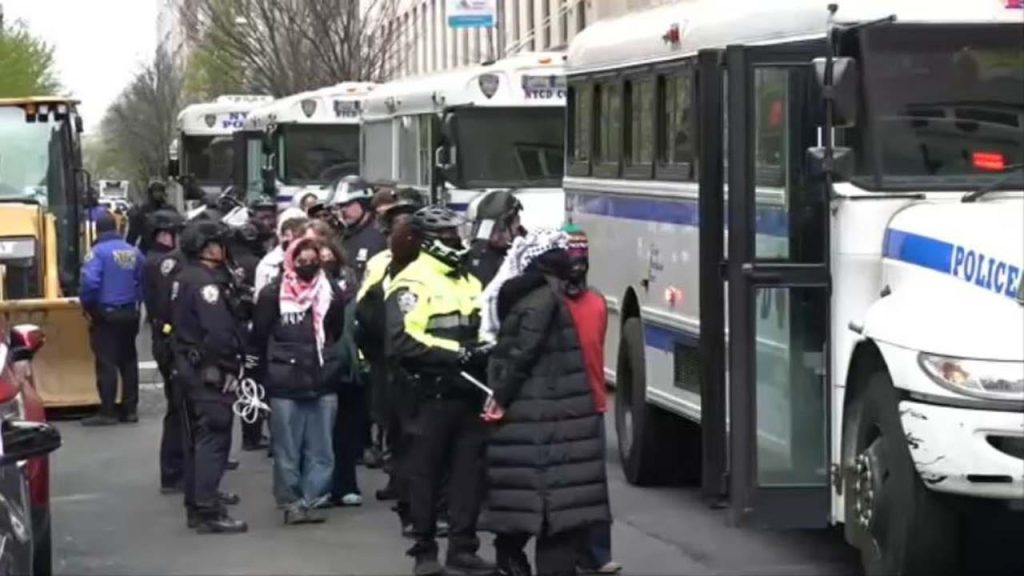Police removed anti-Israel protesters from Columbia University’s campus in New York City after demonstrators set up an encampment on a campus lawn. Columbia University President Minouche Shafik sent a message to the student body, stating that the removal was necessary due to safety concerns and extraordinary circumstances. Video footage showed officers loading protesters onto police buses. The protesters had been camping out in tents since early Wednesday, calling on the university to divest from companies with ties to Israel while Shafik was testifying on Capitol Hill about antisemitism on campus. The university had locked down the campus to ID holders only in anticipation of unrest.
Shafik mentioned that the protesters had violated a long list of rules and policies by establishing the encampment and rejecting all attempts by the university to resolve the situation. She expressed regret over having to take these steps and encouraged compassion and solidarity within the Columbia community. The removal of the protesters took place in a challenging moment, and Shafik emphasized the importance of empathy and respect. The university had provided multiple notices of the violations to the protesters, but they continued with their demonstration. The situation escalated further as Shafik faced questioning from Congress regarding antisemitism on the campus.
The protests and encampment on Columbia University’s campus led to a confrontation between the demonstrators and the police, resulting in the removal of the protesters from the South Lawn of Morningside campus. The protests were aimed at pressuring the university to divest from companies with ties to Israel, and the protesters had been camping out in tents since early Wednesday. Shafik authorized the New York Police Department to clear the encampment due to safety concerns and the violators refusing to comply with the university’s fire safety regulations. The removal of the protesters marked a significant moment in the ongoing tensions between pro-Palestinian and pro-Israeli groups on campus.
The police intervention in removing the anti-Israel protesters from Columbia University’s campus marked a significant development in the ongoing tensions surrounding the Israeli-Palestinian conflict. The encampment on campus led to demonstrations, lockdowns, and confrontations between protesters and law enforcement officers. The university’s president, Minouche Shafik, expressed regret over the situation and emphasized the values of empathy and respect within the Columbia community. The protests highlighted the complexities of addressing political and social issues on college campuses while upholding safety and security measures.
The removal of the anti-Israel protesters from Columbia University’s campus raised questions about freedom of expression, protest rights, and the limits of activism in academic settings. While the protesters were advocating for divestment and drawing attention to human rights issues, their actions resulted in a response from the university and law enforcement due to safety concerns and violations of campus policies. The incident sparked debates about the boundaries of activism, the role of universities in addressing political controversies, and the balance between academic freedom and recpectful dialogue. The clashes between pro-Israel and pro-Palestine groups at Columbia University reflected broader societal divisions and challenges in navigating complex geopolitical conflicts within educational institutions.
In conclusion, the removal of anti-Israel protesters from Columbia University’s campus following their encampment was a result of safety concerns, violations of campus policies, and ongoing tensions related to the Israeli-Palestinian conflict. The protesters’ actions and the university’s response highlighted the challenges of addressing political issues on college campuses and maintaining a safe and inclusive environment for all students. The incident sparked debates about freedom of expression, the limits of activism, and the responsibilities of academic institutions in managing social and political disputes. The encounter between protesters, law enforcement, and university officials underscored the complexities of navigating contentious topics within the educational landscape and the need for empathy, respect, and dialogue in addressing conflicting viewpoints.FOR THE LATEST NEWS FROM FOX NEWS CLICK HERE


